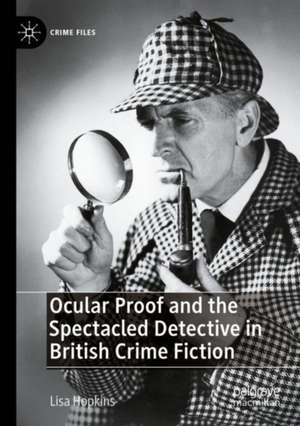Ocular Proof and the Spectacled Detective in British Crime Fiction: Crime Files
Autor Lisa Hopkinsen Limba Engleză Paperback – 19 iun 2024
| Toate formatele și edițiile | Preț | Express |
|---|---|---|
| Paperback (1) | 677.91 lei 38-44 zile | |
| Springer Nature Switzerland – 19 iun 2024 | 677.91 lei 38-44 zile | |
| Hardback (1) | 725.92 lei 43-57 zile | |
| Springer Nature Switzerland – iun 2023 | 725.92 lei 43-57 zile |
Din seria Crime Files
-
 Preț: 279.72 lei
Preț: 279.72 lei - 20%
 Preț: 691.33 lei
Preț: 691.33 lei - 20%
 Preț: 690.67 lei
Preț: 690.67 lei -
 Preț: 387.58 lei
Preț: 387.58 lei -
 Preț: 384.86 lei
Preț: 384.86 lei -
 Preț: 386.39 lei
Preț: 386.39 lei -
 Preț: 386.81 lei
Preț: 386.81 lei -
 Preț: 415.18 lei
Preț: 415.18 lei -
 Preț: 383.93 lei
Preț: 383.93 lei -
 Preț: 388.72 lei
Preț: 388.72 lei - 15%
 Preț: 581.79 lei
Preț: 581.79 lei -
 Preț: 388.34 lei
Preț: 388.34 lei - 15%
 Preț: 636.45 lei
Preț: 636.45 lei - 15%
 Preț: 581.98 lei
Preț: 581.98 lei -
 Preț: 383.12 lei
Preț: 383.12 lei -
 Preț: 386.81 lei
Preț: 386.81 lei -
 Preț: 385.84 lei
Preț: 385.84 lei -
 Preț: 386.00 lei
Preț: 386.00 lei - 15%
 Preț: 464.97 lei
Preț: 464.97 lei - 15%
 Preț: 643.16 lei
Preț: 643.16 lei -
 Preț: 385.84 lei
Preț: 385.84 lei - 15%
 Preț: 481.68 lei
Preț: 481.68 lei -
 Preț: 389.31 lei
Preț: 389.31 lei -
 Preț: 387.75 lei
Preț: 387.75 lei - 15%
 Preț: 554.27 lei
Preț: 554.27 lei - 15%
 Preț: 637.93 lei
Preț: 637.93 lei - 15%
 Preț: 583.28 lei
Preț: 583.28 lei - 15%
 Preț: 697.47 lei
Preț: 697.47 lei - 15%
 Preț: 636.63 lei
Preț: 636.63 lei - 18%
 Preț: 784.13 lei
Preț: 784.13 lei -
 Preț: 389.70 lei
Preț: 389.70 lei -
 Preț: 333.70 lei
Preț: 333.70 lei - 15%
 Preț: 666.19 lei
Preț: 666.19 lei - 15%
 Preț: 649.06 lei
Preț: 649.06 lei -
 Preț: 381.00 lei
Preț: 381.00 lei -
 Preț: 385.84 lei
Preț: 385.84 lei -
 Preț: 389.88 lei
Preț: 389.88 lei
Preț: 677.91 lei
Preț vechi: 744.95 lei
-9% Nou
Puncte Express: 1017
Preț estimativ în valută:
129.76€ • 140.99$ • 109.07£
129.76€ • 140.99$ • 109.07£
Carte tipărită la comandă
Livrare economică 16-22 aprilie
Preluare comenzi: 021 569.72.76
Specificații
ISBN-13: 9783031298516
ISBN-10: 3031298519
Pagini: 193
Ilustrații: X, 193 p.
Dimensiuni: 148 x 210 mm
Ediția:2023
Editura: Springer Nature Switzerland
Colecția Palgrave Macmillan
Seria Crime Files
Locul publicării:Cham, Switzerland
ISBN-10: 3031298519
Pagini: 193
Ilustrații: X, 193 p.
Dimensiuni: 148 x 210 mm
Ediția:2023
Editura: Springer Nature Switzerland
Colecția Palgrave Macmillan
Seria Crime Files
Locul publicării:Cham, Switzerland
Cuprins
Part I: Through a Glass Darkly.- Chapter 1: Introduction: What the Spectacled Detective Sees.- Chapter 2: Out of Focus: Ariadne Oliver.- Part II: Seeing the Unseen.- Chapter 3: Scouting Skills: Max Carrados, Sherlock Holmes’ Blind Rival.- Chapter 4: An Unseen Hook and an Invisible Line: Father Brown.- Part III: Seeing Through Glass.- Chapter 5: The Man with the Monocle: Lord Peter Wimsey.- Chapter 6: An Ass in Horn-Rims: Albert Campion.- Part IV: Binocular Vision.- Chapter 7: Seeing Double: Inspector Alleyn.- Chapter 8: The Double Vision of Dornford Yates.- Chapter 9: Conclusion.
Notă biografică
Lisa Hopkins is Professor Emerita of English at Sheffield Hallam University, UK. She has published widely on Renaissance drama (particularly Shakespeare, Marlowe and Ford), adaptation studies, and more recently crime fiction. She is co-editor of Shakespeare, the journal of the British Shakespeare Association, and of the Arden Guides to Early Modern Drama. Her previous books include Shakespearean Allusion in Crime Fiction: DCI Shakespeare (Palgrave, 2016) and Burial Plots in British Detective Fiction (Palgrave, 2021).
Textul de pe ultima copertă
From Sherlock Holmes onwards, fictional detectives use lenses: Ocular Proof and the Spectacled Detective in British Crime Fiction argues that these visual aids are metaphors for ways of seeing, and that they help us to understand not only individual detectives’ methods but also the kinds of cultural work detective fiction may do. It is sometimes regarded as a socially conservative form, and certainly the enduring popularity of ‘Golden Age’ writers such as Christie, Sayers, Allingham and Marsh implies a strong element of nostalgia in the appeal of the genre. The emphasis on visual aids, however, suggests that solving crime is not a simple matter of uncovering truth but a complex, sophisticated and inherently subjective process, and thus challenges any sense of comforting certainties. Moreover, the value of eye-witness testimony is often troubled in detective fiction by use of the phrase ‘the ocular proof’, whose origin in Shakespeare’s Othello reminds us that Othello is manipulated by Iago into misinterpreting what he sees. The act of seeing thus comes to seem ideological and provisional, and Lisa Hopkins argues that the kind of visual aid selected by each detective is an index of his particular propensities and biases.
Lisa Hopkins is Professor Emerita of English at Sheffield Hallam University, UK. She has published widely on Renaissance drama (particularly Shakespeare, Marlowe and Ford), adaptation studies, and more recently crime fiction. She is co-editor of Shakespeare, the journal of the British Shakespeare Association, and of the Arden Guides to Early Modern Drama. Her previous books include Shakespearean Allusion in Crime Fiction: DCI Shakespeare (Palgrave, 2016) and Burial Plots in British Detective Fiction (Palgrave, 2021).
Caracteristici
Studies visual aids as metaphors for ways of seeing in detective fiction Investigates the value of eye-witness testimony Considers famous characters including Sherlock Holmes, Lord Peter Wimsey, Mrs. Ariadne Oliver and more
